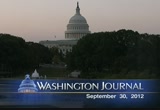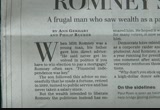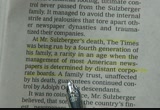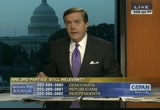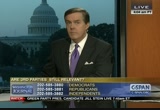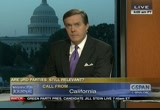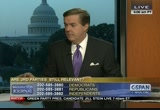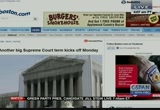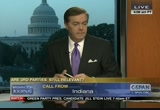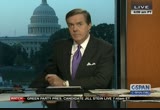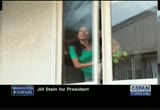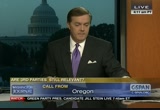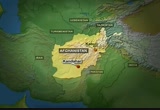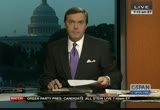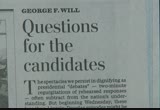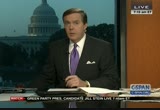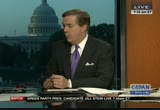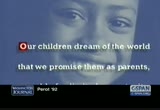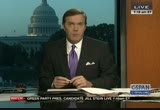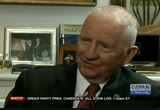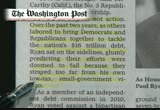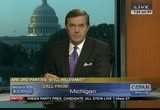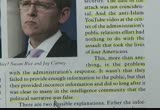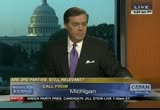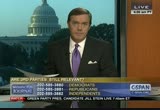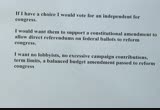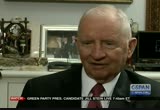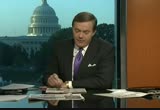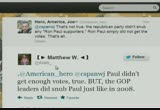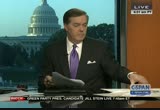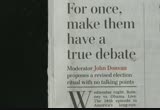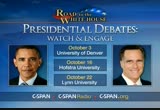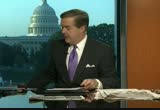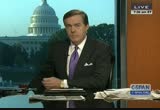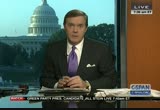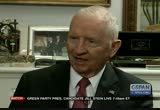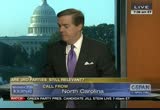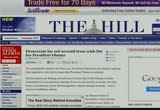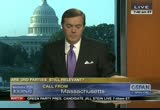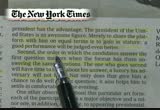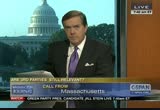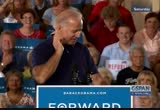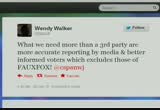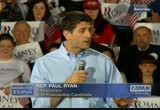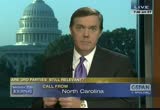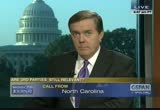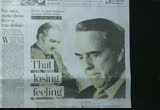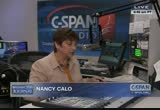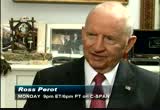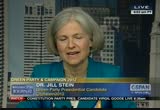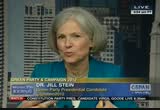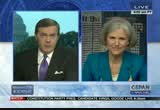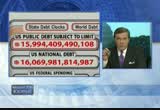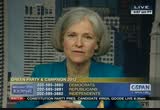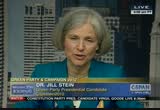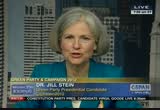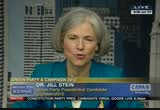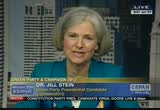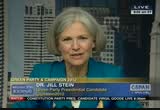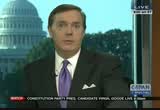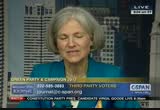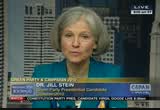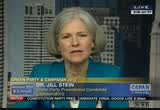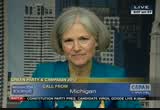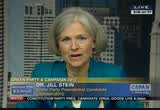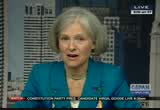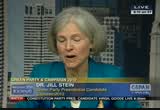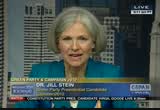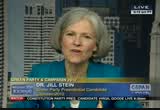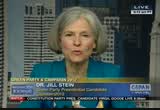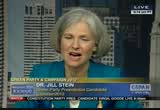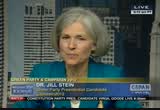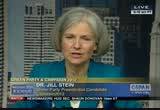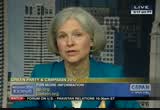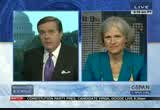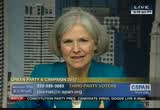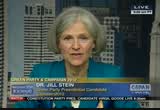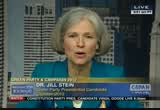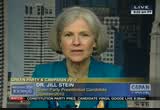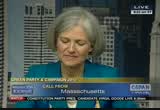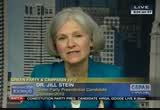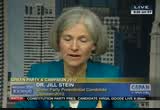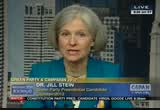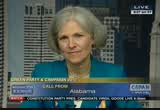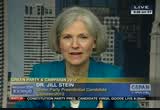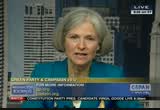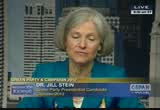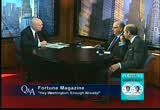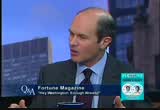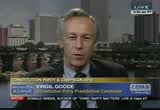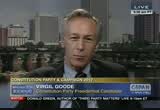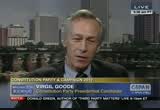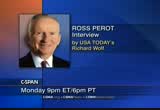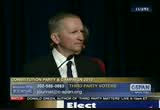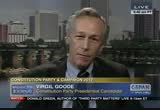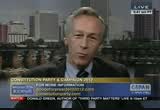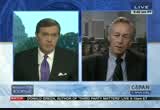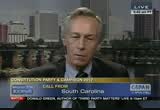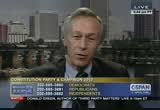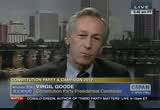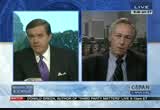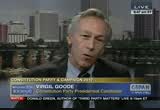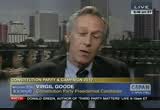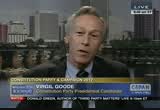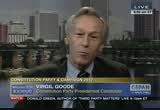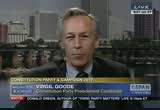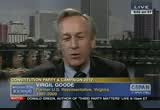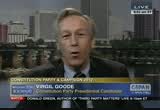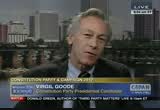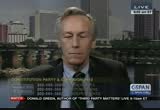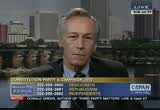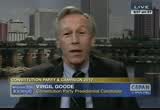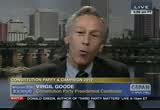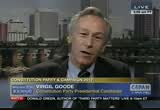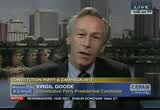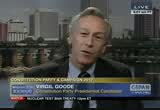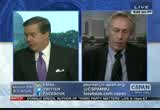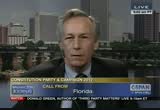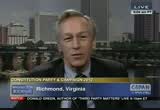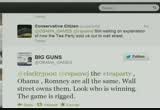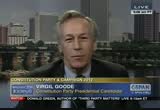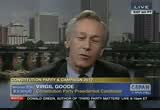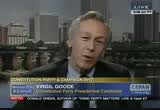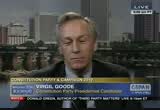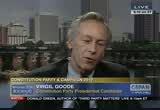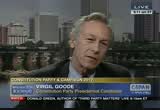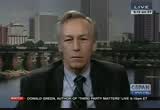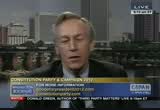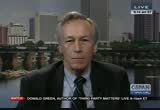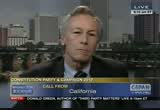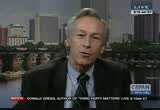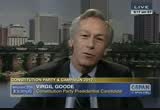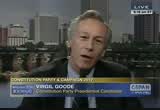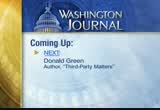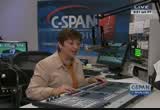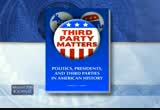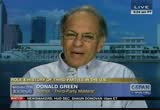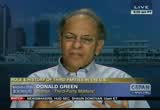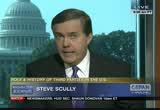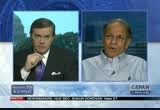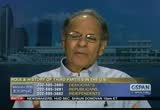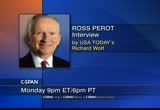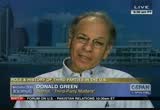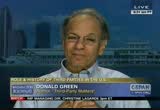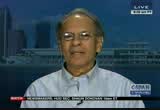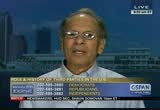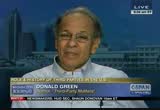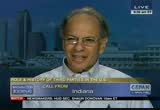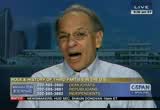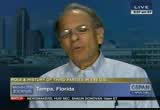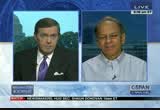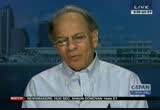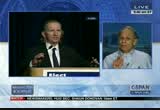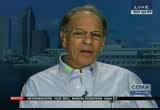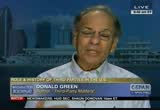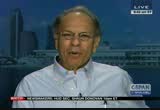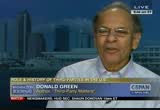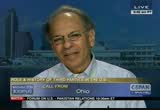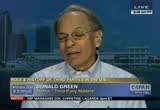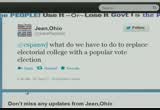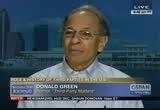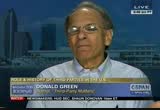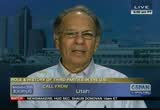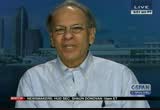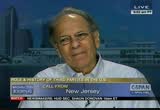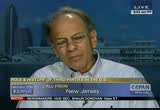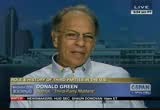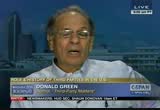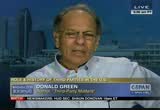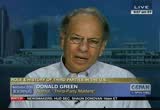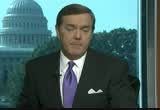tv Washington Journal CSPAN September 30, 2012 7:00am-10:00am EDT
7:00 am
donald greentalks about his book "third party"washington jo. host: good morning, a live view of the capitol this morning. the president will prepare for wednesday's's presidential debate with his republican rival medtronic, the first of three debates taking place on the campus of the university of denver. also, at st. cathedral, the mass will commemorate tamara's start of the new term of the supreme court.
7:01 am
newamara's start of the term of the supreme court. we want to turn our attention to third parties with this question -- are they still relative in american politics? you can join the conversation on our twitter page and send us an e-mail. the numbers are on the screen. we will get to your calls and just above it. trapped.ey's money it says --
7:02 am
that is a " mitt romney has used often on the campaign trail. on the front page of "the new york times", an obituary. it points out he guided the new york times and its parent company through a long and sometimes turbulent time of change. he died early yesterday and new york after a long illness announced by his family. he was chairman and chief executive of the new york times reaching across 34 years from the heyday of postwar america to the twilight of the 20th century. his obituary is front page and inside the new york times. at the time of his death this weekend, "the times" has been run by a fourth generation of
7:03 am
his family, a rarity in an age when management of most american newspapers is determined by distant corporate boards. this week was the start of the u.s. supreme court. whoce by david saveagage covers the court. the question on this sunday morning -- our third party is still relevant? we will be checking in with two third-party candidates later in the program. tomorrow gary johnson will be joining us. we will begin with mark from
7:04 am
illinois on the line for independence. caller: i just have to say that the whole republican and democratic thing is getting out of control. i am 62 years old. i go back from eisenhower on. i call them republicrats. they all go for the same corporations. is so undemocratic it is ridiculous. we have to get somebody new in the system. it is gridlock. the congress cannot get anything done. these people just go make deals and make money for themselves. we have to get some new blood
7:05 am
into this system. host: thank you for the call. we will be covering the debates. we invite you to watch and engage the mentor of the debates. you can do this on our facebook page. -- engage in the debates. we have covered every debate since 1984. the first debates took place and 1960, 52 years ago. next is bill also on the line for independents. caller: no more important today than they have been in the past. the two main parties, it gets harder and harder to distinguish them from one another. it gives the person a chance to really put out and vote for what they believe in. i think as more and more people start voting for third parties
7:06 am
and their conscience, you will see one of the two major party start listening. your biggest chance of affecting changes to probably find a third party that is close to what you believe in and sticking with them until some other party comes along and it does what the people want. hoshost: jill stein will be joig us and about 40 minutes. later in the program we will have a conversation on the history of third parties. many times third-party candidates have ran but have never won. caller: good morning.
7:07 am
i do not think they are relevant. host: why is that? caller: like you say, they never win. they more or less upset democrat and republicans. i am old enough to remember ralph nader and that situation. i just think they end up kind of having one group win that should not have one. host: to write for the call. one of our viewers saying -- more on ross perot coming up in a moment. a chance to hear him in his first interview in many years, an interview that took place on thursday from plano, texas.
7:08 am
in another busy week as the supreme court kicks off its term. the piece points out -- now the supreme court is embarking on a new term tomorrow that could be as contentious as the last one with the prospect for a major rulings on affirmative action, day marriage, and voting rights. as you saw, that photograph from outside the supreme court. some construction taking place. next is john from indiana. the republican line, good morning. caller: if you look at the gallup polls, you can pretty much see that democrats are losing a lot. their registration between 2004
7:09 am
and until now. you look at the republicans and what they are not able to get across is the fact we have a big financial cliff that we are going to go over. nobody is worrying about that. i think third parties are going to gain a whole bunch by the fact that when our nation does go over the cliff financially or we have a lot more problems, people are going to leave the party. they are going to become more and more involved in what is happening in our nation. it has not been so much in the past. they just upset the elections for some of the candidates. i just think they will be more relevant in the future. as the tea party is not able to help out with the republicans, i
7:10 am
think he will see a lot of people in the grass roots level leave the two parties and go to the third party. host: thank you for the call. jill stein just received a hundred $60,000 from the election commission because she is -- $160,000, she is out with a new web ad proclaiming with the green party is all about. [video clip] >> it is an end to unemployment, climate change and an end to corporate role. we are not talking spare change, we need a revolution. that is what we deserve it. what we do not deserve is pandering irresponsible [beep] passing itself off as campaigning. i cannot believe i said that, but that is how i feel.
7:11 am
>> i am voting for jill stein. >> we need a green president. vote for jill stein. >> i am voting for jill stein. >> i am jill stein. i approve this message. host: dr. jill stein will be joining us later in the program. from the twitter page -- our question if you are just joining us are listening on c- span radio -- are third party is still relevant? cory is on the phone from portland, oregon. caller: as somebody who has done an extensive amount of the voter
7:12 am
registration, especially recently for the current election, i have to say that i am one of the people who actually believe in the american dream and i think democracy is still relevant. i think each individual vote actually counts. when we have third-party candidates, it really gives people a chance to embrace a candidate that actually embraces what they visualize as their actual ideals. not just having to choose between candid it a or candid it be. -- canidate a or candidate b. i really want to thank you for c-span. it is an excellent service. host: thank you for the call. this headline --
7:13 am
an afghan soldier turning his gun on the american troops at a checkpoint at the east, killing two americans and two fellow in the afghan army continuing a disturbance continuing of killings. the string of insider attacks is one of the greatest threats in the country danger in a partnership of training afghan security forces as well as with a drawing saturday troops -- withdrawing troops. the afghan official speaking on animated the saying three soldiers killed in the class, it is not clear if the assailant is among the dead. back to your calls. ed is on the fund. caller: good morning c-span.
7:14 am
the republican party made a critical mistake in failing to embrace ron paul supporters, especially going into the convention. these voters are now abandoning mitt romney in the republican party. the overwhelming majority of them will vote for gary johnson and the libertarian party. the big story a day after the election day will be the libertarian party increased its vote to buy five or tenfold compared to the votes in 2008. host: thank you for your call. we will have the libertarian candidate tomorrow. inside the washington post --
7:15 am
15 fatalities has been at the hands for our allies. why are we staying there for a 27 more months? caller: i do not think third parties are relevant. i explained the government as a two party government. that is how i think it should stay. third parties -- they have never made an impact in elections. i do not think they are relevant at all. i want to thank you for letting me get -- this is my first time in years i have gotten on c- span. host: we are glad to hear from me. caller: know, i do not think they are relevant.
7:16 am
host: next is shannon from missouri. are you a member of a third party? caller: yes. you get disgruntled with you hear people like bill oreilly and sean hannity saying ron paul can't win. it every time he gets up to speak he draws a bigger crowds then obama or romney. the motion is amazing. i run into so many people -- you always hear they cannot win. if they could get more coverage other than c-span, c-span are the only people that are fair to third-party people compared to fox or cnn or ms nbc or any of the other ones. i wish more people would watch c-span and educate themselves to receive more votes. host: thank you for the call.
7:17 am
one of your saying -- as we said earlier, ross perot sitting down for his first extended interview in many years. an interview conducted in plano, texas on thursday by richard wealth. they were agreeing to have our cameras in the room. it is a 70 minute conversation including david walker, who has been working with him on a number of initiatives to educate voters on issues in the election. the debt and deficit exceed $16 trillion. his article will appear tomorrow in usa today. we will show you an excerpt in just a moment. first some context to ross perot. when he ran as a third-party, he talked about the growing debt. \ [video clip]
7:18 am
>> the world of a unlamented opportunity. what what they say to us if they knew by the year 2000 we will have left them with a national debt of $8 trillion? what would they say if they knew we make them the first generation of americans with a standard of living below the generation below them? we cannot do this to our children. in this election we have the opportunity to choose a candidate not a career politician, but a proven business leader with the ability to take on the tasks at hand. to balance the budget, to expand the tax base, to give our children back the american dream. the candidate is ross perot. the issue is our children. the choice is yours. host: from 1992 when he ran his
7:19 am
first of two independent bids for the white house, falling short in 1992 and 1996. one viewer says we need to listen to all points of view. we need third parties. one question is the role of third parties in politics. here is ross perot. >> you ran twice. you established the united we stand and the reform party. do you feel that is needed today? is there something wrong with the two party system that has gotten more acrimonious. >> it is almost impossible to do it. it would be a very healthy thing if you could get it done and make it happen. it is very difficult to do, and very few people would want to try to do it because they know
7:20 am
they will be butchered from day one. much of the media will participate actively in that. host: the whole interview conducted by richard welfare's tomorrow evening at 9:00 eastern time -- richard wolf there's 9:00 eastern time. it runs over one hour. regarding the debt and the deficit, there is this piece from "the washington post." in the debt crisis, ryan was on the sidelines.
7:21 am
there is a " further in the body from a republican senator who set up a " i have never viewed it paul as one who gets into the fray from a negotiating standpoint. i do not mean that he cannot do it. i just mean he has chosen not to." becky is on the phone from michigan. caller: good morning. i was trying to think what year it was when ralph nader ran for president. you and only you as far as i know carried a debate. i think there were three people that were other parties. host: it was 2000.
7:22 am
caller: i listened to those -- the ones that were not the mainstream democrats and republicans. even though i may not vote for them, that is not what is important. what is important is that every single one of them had at least one just terrific idea for solving some kind of big problem we have a. -- we have. to have those people up there with the democrats and republicans talking about things that have never been talked about before could get the people to start calling their senators and saying, hey, we heard so and so talking about this idea. why do you not try it? really get on them.
7:23 am
i hear them talking about the same things over and over again. what have they done? nothing. host: thank you for the call. from the twitter page -- you can join the conversation on twitter, facebook or send us an e-mail at journal@cspan.org. steven haze has this editorial. talking about the attacks and libya.
7:24 am
joe is on the phone on the republican line. our third party is still relevant? caller: no. ross perot had a wonderful opportunity to open up people's mines and he talked about things. the problem with that is he is a billionaire just like everybody else. it was a business decision. at the end of the day he is back to eric -- back to making money or the rest of us have to decide whether we can pay house note, carnot, pay for our kid's education just to get through the day. if he were serious about a third party, then he should have
7:25 am
stayed there to have a third party. i voted the man not the party. when i look at what mr. romney is doing and mr. ryan is doing as opposed to what i already know about president obama, i am proud of him -- the things he is talking about as opposed to what they are talking about is about the rich getting richer as opposed to all of us being in this together. i do not have a problem paying more tax to help somebody out right now. i got where i was because of what people did prior to me. if a democrat or a republican needs a little help now, are we going to be americans and help
7:26 am
each other out? are we going to play the race card in some situations, the money card the culture card? america is better than that. i want to see us take all of the good of everybody. host: thank you for the call. next is said joining us from georgia. the independent third party line. caller: i would like to make three or four quick points. as far as the a row corp. -- the irrelevancy of third parties, ralph nader was very relevant and florida. to the point about -- i am a libertarian.
7:27 am
ross perot is the data kind of got me listening to politics in 1992. the situation we are in today is because of a two party system. democrats and republicans have put us here. my republican friends to chastise me for my upcoming vote for gary johnson, i simply tell them that it really does not matter which one of these guys you vote in. the country is going to hell in a handbasket. it might get there faster with barack obama and mitt romney, but get there it well. i think once it gets there and the country goes through a rough spot is when people will come to realize that they really cannot depend on government. they have to depend on themselves. it will get behind the libertarian party. host: thank you for the call. we will have the libertarian candidate tomorrow.
7:28 am
a couple of e-mails. here is more from ross perot in the interview that took place thursday in plano, texas. >> do you not think it is interesting that in all of these really rough times with these big numbers, the house, the senate, and the white house do not reduce their salaries? >> do you think they should? >> in a company would have to.
7:29 am
that never even comes up. the point being, all of the things -- if that is the condition of our country, they need to set the first example of making a cut back to themselves. host: the interview with ross perot conducted by richard wolf, you can watch it tomorrow night at 9:00 eastern time. haley peterson is saying --
7:30 am
next is sandy from indiana. caller: thank you. i think third parties are very relevant now, more now than ever. if ross perot had gotten elected, maybe all of our jobs would not be overseas and we would not be in the miss we are in. i think the green party should be able to get in there and get in the debate. libertarians, whatever. i am tired of voting against somebody instead of for somebody. host: thank you for the call. from one of our viewers saying --
7:31 am
7:32 am
is, of course third party candidates are relevant because -- it is enough -- if enough people vote for the third party, it affects the other aspects of the election. going back to ralph nader, if he had started his own party -- the consumer advocates party or something -- maybe he would have gone further. the whole thing with ross perot, you have been talking about him. if he was not involved in that debate, there are a lot of republicans who would have thought differently about a lot of other issues than what he was talking about. indeed, the third party does make a difference. host: thank you for the call. there is a piece this morning from inside "the washington post." it has this headline we wanted to share with you.
7:33 am
he says -- these interviews unfold a side-e that is from this morning. the debates get under way this wednesday. we will take you inside the university of denver for you to watch as they prepare for the debate. it gets under way at 9:00. only on c-span will you have a chance to see what happens one half hour before the networks carry the debate coverage. a 90 minute exchange focusing on domestic issues including the
7:34 am
economy and jobs. the second debate on the campus of hofstra university. politico has this piece about jim leher. for the first time in the 2012 campaign, the president and mitt romney will face each other in what many consider the most important even between now and november 6. for the 12th time in the history of debates, jim leher has been asked to serve as moderator making him the most experienced a moderator and the modern history, he is uniquely suited according to his contemporary. at a time when the electorate is as divided as ever and wind -- media scrutiny is -- next is hayley.
7:35 am
welcome to the program. caller: good morning. thank you for taking my call. i am one of the people who spend every summer for the last few summers going around the nation asking questions. my main question is, what do people think politically and what they are paying attention to. you say are a third party is relevant, yes, they are. they will never get any kind of support as long as the american people are more interested in things like "dancing with the stars." that is a problem people have. it will not watch c-span or cnn. they will watch fox news or ms nbc. they will not vote. there are literally telling me all the time, i do not have time for that. i have to get some new louis baton. i am standing with my mouth wide
7:36 am
open like, are you serious? you want a new job or a higher pay rate. third parties -- that is a hard fight. i am trying to start my own third party. that is why i am trying to do this to figure out how to get the american people to pay attention. host: who are you voting for in this election? caller: honestly, myself. i would rather ride myself and because i trust myself more than anyone else to run it. i will never vote for anyone anymore except for ron paul. host:from jim, one of our most profliic -- prolific tweeters -- more from ross perot as he looks at what the country needs, focusing on public education and
7:37 am
the american school system. >> strong, moral, ethical base. i had a job growing up in the depression. now the divorce rate is, what, over 50%? that is destabilizing. when i grew up in the depression, we had the finest public schools in the world. the one thing a democracy must have is a well educated population. our public schools are at the bottom of the industrialized world. the great state of texas, where i went to public schools and had an incredible education, it is either 47 or 48 in 50 states. that is our responsibility. we can correct it. with the problems we face now,
7:38 am
it is so fundamental about what we must do now. we have to do a lot by being involved. host: ross perot who is now 82 years old sitting down for a rare interview in front of the c-span cameras by usa today's richadr wolf. you can watch this tomorrow at 9:00 eastern. 6:00 for those on the west coast. it is likely to be the front page of "usa today." paul has this point. bernard on the democrats' line. caller: good morning. a third party cannot be relevant at this time because we have a
7:39 am
struggle between both parties. i think we already have one called independents. host: thank you. the front page of the new york times. mitt romney coming up short with undecideds. a new poll is expected to come out following the first presidential debate. house democrats already writing their wish list hoping the president is really elected. they are placing a focus on jobs and the economy and also discretionary issues like immigration, climate change, housing, and even a return to health care. it would lend the president a new fistful of political capital
7:40 am
as he confronts republican leaders about how to steer the country through the next four years. his allies in the house are offering tips on how to spend it. next is kevin from massachusetts on the republican line. caller: good morning. i loved ross perot in the 1992. i love his pointer and his board. he got his point across with his pointer. people do not want that. like one caller said, we spend more time watching these crazy shows on tv that are more important in getting our country on track. with this president i have seen poverty, welfare, entitlements and growing at a rapid rate. i have seen the people who are unemployed for four years still trying to find ajob and they are
7:41 am
7:42 am
next is aurther from massachusetts. caller: good morning. i think it is very significant to have third parties. my reason for that is, i love ron paul. the problem is that whether voting democrat or republican, you are still voting on a democracy. this is a republic. by having right and candidates, you are trying to put the republic back. -- write-in candidates, you are putting in the republic back. ron is --
7:43 am
host: we lost the call. from the campaign trail of the weekend, they are leaving it to the running mates including joe biden in the fort myers, florida with what he thinks the campaign is all about. >> this country is facing the starkest choice for president that we have faced at least in my memory. now that governor mitt romney has made it official and he has picked paul ryan, they are both decent man. i do not need your boos. i need your help. i want to be straight with the. [applause] i have a bad reputation of
7:44 am
being straight and telling you what i think. sometimes all of what i think. all kidding aside, in taking paul ryan, what gov. romney did is he has given clear definition to all of those vague assertions he was making during his primary campaign. he talked a lot about a lot of the things paul ryan is talking about, but never in any detail. by laying out why he was picking paul ryan, he picked paul ryan because paul bryant represents the ideological -- the center of the republican party. host: the vice president yesterday. the question is, arthur party is still relevant? when the walker has this-- wendy walker has this --
7:45 am
from the campaign trail in new hampshire, congressman paul ryan campaigning in the southern part of the state. >> this is a high-stakes election. if we have four more years like the last four years, we will continue stagnation. the choice is very clear. do we want a dynamic and growing economy that fosters opportunity, or do we want a statment economy that fosters dependency? that is not who we are. in the live free or die state, we want to live free and prosper. [applause] when president obama came into office, he inherited a tough
7:46 am
situation. there are no two boys about it. the problem is, the obama economic agenda failed -- there are no two ways about it. it failed because it was bad. he came into office with one party rule. host: paul ryan and new hampshire. our third party is still relevant? caller: good morning. relevant not as parties but in terms of spoilers. they have been relevant with mr. ross perot. i like him. i think he could have done wonderfully if he stayed within the republican party. i google this. we have had 132 third party presidential candidates going back to 1832 when it was the
7:47 am
anti mason party or something like that. none of them have garnered much of the vote. there are mostly french candidates. i do not said derogatory. they do not have a lot of base. it is not that they are not popular because they get no media, they get no media because they are not popular. even ron paul and even ross perot. the great example of the difference between third parties, fifth parties and 10th parties is europe. many countries have multiple parties. green parties, social parties, labor parties. they all put up candidates whether for prime minister or president or members of parliament or whatever their legislative houses. very often nobody ever gets a majority of the vote. they have to cobble together --
7:48 am
the word is used by the media -- cobble together a majority government. host: the big difference is they are a parliamentary system and we are not. caller: you are right. but we do not have multiple parties, but we do have multiple perspectives. everybody from dennis to signage on the far left to ron paul on the far libertarian right. host: we are short on time. thank you for the call. we welcome our viewers on the bbc channel. two essays from two former party nominees. george mcgovern who lost in 1972, bob dole -- on november 6
7:49 am
either obama or romney will face defeat. how will they handle it? coming up in a few moments, jill stein will be joining us from boston to talk about her race for the presidency. later, virgil goode on his own third-party bid. good morning, nancy. >> on today's talk shows, the focus is campaign 2012 and the upcoming presidential debates. appearing on several of these shows is chris christie. c-span radio brings you three years beginning with me to the press. white house senior adviser and ralph reid. at 1:00 hear "this week" including christ christie, haley
7:50 am
barbour. at 2:00 it is fox news sunday. chris wallace sits down with paul ryan. the state of the union follows with guests including john mccain and roy blunt, martin omalley, and david axelrod. at 4:00, the host of the face the nation talks with crist christi, newt gingrich, and marha blackburn. they are brought to you as a public service by the network and c-span. they began at noon eastern with "meet the press," "this week, fox news sunday, state of the union, and face the nation from cbs. you can listen to them all on c-
7:51 am
span radio here in the washington, d.c. area. nationwide on xm satellite radio. you can go online to cspanradio.org. >> every nation has -- generation has sacrificed. we were then spending their money. we are now even more -- much more spending their money. we are leaving them a mass that will be a very difficult to deal with hand. just think of who was to come here first and take us over. the last thing i want to see is our country taken over because we are so financially weak we cannot do anything. we are moving in that direction. we are on the edge of the cliff. we have to start fixing it now.
7:52 am
otherwise we are leaving a disaster to our children and grandchildren. we could even lose our country. >> ross perot on the economy, the deficit, and the debt and how it has changed since he ran for president in 1992 and 1996. ross perot, monday night on c- span at 9:00 eastern. host: joining us from boston is jill stein. thank you for being with us on c-span. guest: it is creek to be with thee. host: we want to get to calls and comments, but let's begin with one of the latest ads on why you are a member of the green party and what it means to be a member. [videoclip] >> green means a guaranteed job
7:53 am
for every american, including you. every terrible economy. and no more student debt. a new deal for america. keeping every family in their home. i am jill stein. we are proud to approve this message. >> we invite you to go green at jillstein.org. host: why did you decide to pursue the nomination, and what is your plan for november? guest: i was moved to enter into the race because i hit the breaking. like so many other americans. i have been involved in local and state politics before now. that is where grass-roots democracy builds. that is where we build up to higher levels of governments. when i heard the president when year ago put medicare and social
7:54 am
security on the chopping block, and medicaid as a solution to the crisis, i said, we cannot allow this to go unchallenged. that is what actually brought me into the race. i got a involved to help recruit somebody that could run and represent the green party. and represent the solutions that the american people are clamoring for. in the process, when you join a recruiting committee, sometimes you get recruited yourself. going back, i became involved with the green party to start with about 10 years ago when as a doctor and a mother -- a medical doctor and a mother, i felt like things were unraveling around us. we really did not have a feature to provide for our children. in so many ways from the economy and the rise of epidemic disease, i began to work with
7:55 am
our elected officials thinking that surely they would want to do the right thing. i felt like, we have real alternatives. i was working in the community to develop alternatives. for example, clean, renewable energy that saves lives and saves money. in order to get to the solutions, we need to fix the broken system. i became with the green party because it is the one that is not bought and paid for by the usual suspects, by wall street and the big corporations that bought out the two major parties and are giving them the marching orders. the green party provides a vehicle to advance the solution that the american people are clamoring for. as we look at the u.s.
7:56 am
debt clock, the higher number on the bottom of the screen an excess of $16 trillion. with that in mind, how do you jump-start the u.s. economy? what is the role of the federal government and how do you pay for it? guest: fortunately we have some good examples. there is a track record for how to do this. we can go back to the great depression and see that a new deal went a long way to move us out of the depression. that means creating jobs. you can look back to win the national debt began to skyrocket. it was with the crash of the economy after the abuse, waste, and fraud on wall street and other areas as well. in particular, it was the wall street caused crash that made revenues plummet and cause the national debt to increase. host: you refer to the new deal,
7:57 am
the government was not dealing with a $16 trillion debt. how do you create a new deal program and how do you paid for it? guest: exactly. we got to the $16 trillion debt for a number of reasons. it was the revenue crash, the two wars i and paid for, and tax breaks for the wealthy that have been accumulated. one thing you do is ask the wealthiest members of society, the multi millionaires and billionaires to start paying their fair share through a wall street transaction tax. why should wall street be exempt from a sales tax everyone else pays? it also in addition to generating revenue restricts -- it begins to put some control on this reckless waste and gambling that is taking place on wall street. instead of the reckless
7:58 am
speculation, you have thoughtful investments when there is a small tax. in another way is, let's go back to year 2000 defense department levels. we have a very bloated, wasteful military budget that has doubled over the year 2000. are we twice as secure? i do not think so. we can look at the blow back happening across the middle east. you can see having this hyper military is a man these drone wars and pakistan and somalia, which the president began to expand on day 3 and office. there were no republicans to blame it on. he began to expand the war effort massively. it is calling for $600 billion to renovate nuclear weapons and a new modes of delivering them. this is not the direction we need to go. we need a foreign policy based
7:59 am
on human rights, not on the procurement of oil resources. we provide for a green a new deal that would directly create jobs. because it creates jobs in the green economy, it allows us to back off these wars for oil and save hundreds of billions of dollars on the bloated military. instead it puts that money into jobs, health care, and education -- the things we need at home to create national security. host: the biggest challenge is getting on the ballot in 50 states. tell us about some of the difficulties you and others have encountered while trying to run and getting on each state ballot? guest: yes, there has been -- i am just now seeing that. a little delay here. the system is designed to keep alternative voices out of the
8:00 am
mix. studies show one out of every two voters is not going to vote. that is 90 million eligible voters who will not vote this election. that is twice as many as the number that will vote for barack obama and twice as many as the number that will vote for mitt romney. that means most people do not feel represented by either of these candidates or parties that have such a track record of serving the 1%. the wealthy few whose fortunes have skyrocketed while everyday americans are being thrown under the bus by the day. . .
8:01 am
reduce us our debt, it does not increase t. that we can downsize the military, bring our troops and more dollars home, that we can bail out the students, instead of bailing out the banks. the fed just announced it's undertaken another quantitative easing. this is the third quantitative easing. this is trillions of dollars that they are pouring into wall street, simply to bail them out, when the banks continue to get too big to fail and bigger all the time, and too big to jail. the public does not like this. they want jobs. they want public higher education which is affordable. they want health care as a human right, they won't to downsize the military and
8:02 am
bring the troops home. so the system is designed to lock us out and to make us run through all kinds of hoops just in order to get on the ballot, just in order to be a part of the conversation, and give people some of the choices that they are clamoring for. so we've spent the past 10 months getting on the ballot, we've been very successful in doing that because people have come out of the woodwork to participate in this process and to get us on the ballot, largely through volunteer efforts, unlike the other big parties, they just roll right back in, they're sort of grandfathered into their ballot status but real challengers have to jump through all kinds of hoops. we've done that successfully, we'll be on the ballot for 85 percent of voters, 85 percent of americans will be able to go to the polls and not be forced to simply give a mandate for four more years of what is absolutely driving us over the cliff. so i want to encourage people to go to my website, jill
8:03 am
stein.org, join the team, become informed, learn about the choices that you really have, and you can also sign the petition there to open up the debates, because the american people are clamoring for real choices, and for real voices that reflect their needs and the critical solutions that we are demanding. so go to the website, jill stein.org and become a part of this effort and let's blow past these outrageous censorships and restrictions that prevent us from having a real democracy. >> that 85 percent of the electorate translates into 38 states. our conversation with dr. jill stein, a graduate of harvard medical school, she's also a former candidate for governor in massachusetts, she also ran for a state house seat, she is the co-author of "in harm's way, toxis threats to child development" and author of healthy teaching, a link between health, climate and green economies. our phone lines are open,
8:04 am
202-585-3883 is our phone line if you're a member of the green party or other third parties. larry is on the phone on a republican line from luburn, tkpwoz. good morning. caller: good morning. thank you for c-span. it's one of the greatest things on television. my question, i kind of have a problem with a statement, too, is about the guarantee for jobs for every american. follow up on that in time spent at, you know, that you can guarantee that. what do you do about that certain percentage of americans that just don't want to work. you know, they're out there. how do you address these issues and the statement of guaranteeing. that's, i mean -- kind of bold. strong. i mean, how do you guarantee jobs for everybody? follow up on that, please. host: thank you for the call, larry, we'll get a response.
8:05 am
guest: thank you for that question, larry, and of course it's hard to guarantee, but the idea is that we will do our best to make that happen. as fdr said during the great depression, where the private sector cannot or will not provide jobs, that government will step in to do so. so the green new deal provides for small businesses, for worker cooperatives, it provides direct funding to help jump start what is really the backbone of our economy. currently, both congress and the president have provided these stimulus packages, and so on, that mostly provide tax breaks, or at least the largest portion of them is tax breaks. but unfortunately, tax breaks don't create jobs. so we're saying let's use our taxpayer dollars effectively and put that money into directly creating jobs. this means grants and incentives and subsidies to
8:06 am
jump start small businesses at the community level and worker cooperatives that actually provide for the needs of our communities, in green energy, healthy local food production, public transportation, clean manufacturing, as well as meeting our social needs, for teachers, after-school child care, home care, affordable housing construction, and so on. we want to create the jobs that we need, and at the same time, put people back to work. not only through small businesses and getting them up and running, but also, by creating public works and public services to help provide for some of those needs as well. for example in public transportation, you can't do that by creating small businesses. there's an enormous amount of work that needs to be done in greening our energy production, in upgrading our energy distribution grid, in our public transportation and so on. these can be done as public works, like was done during
8:07 am
the great depression, so that instead of going down to the unemployment office and collecting a check to sort of sit home and feel disconnected, instead, one can collect a check, doing the job in your community which creates transportation, healthy local sustainable food supply, clean energy, and so on. the things that we need to be sustainable, healthy, and prosperous communities. so that that's what we're guaranteeing, is a chance to plug in to the economy of your community and help make it a better place. host: good morning to bob, wist lind, michigan, members of a third party. good morning bob. caller: hi. i have a different kind of outlook on it. i continually vote libertarian, but you know, i look back to the founding of the country and george washington said that we really shouldn't have any parties, and i just wonder if maybe the best solution --
8:08 am
because personally, the libertarian party and green party seem to have a lot of differences, but there's a lot of things we can all agree on, and i'm wondering if we'd be better off as a country getting rid of all parties and just having people run as individuals. host: jill stein, your response. guest: that's a great question, and i would point out that there is a lot that libertarians and greens have in common. we both, for example, believe that liberty, especially our civil liberties, and democracy are very important. i think we both generally want to bring our troops home and have a defense department that's truly a defense department, and that's not costing us a trillion dollars a year, which is what it's costing us right now in the bloated military industrial security complex which is effect -- has effectively made us the policemen of the world with over 1000 bases in more than 140 countries around the world. so i think we also both
8:09 am
believe that this war on drugs is a failed disastrous policy, it actually makes the problem worse, and again, it squanders a lot of our money, actually making drugs more dangerous because of the very violent culture that surrounds, for example, illegal marijuana, much like when alcohol was prohibited. there was much more violence and danger surrounding it than when it was legalize dollars and regulated. so there's a lot that we actually have in common. i think ideally, we would be a society and a real democracy just of every day people. but unfortunately now we are the best democracy that money can buy and large corporations are calling the shots. for example we have this free trade agreement that barack obama is negotiating behind closed doors, congress and the american people cannot
8:10 am
find out what is in it. this is the free trade agreement that as i understand is like nafta on steroids, it continues to export jobs overseas, undermine wages at home and this agreement actually undermines american sovereignty as well by allowing an international corporate board of corporate representatives to rule on american laws and american regulations and tell us whether our laws and regulations are legitimate in the eyes of national corporations and they can fine u. this agreement gives us the ability to cause us taxpayers to have to pay them for the right to protect our environment and our water supply and our climate and human rights and wages and things like that. so this is absolutely outrageous. if we could go back to a system of one person, one vote, and have a real free press that enabled us to communicate and inform each other this would be a wonderful idea. unfortunately we're not there right now, so political
8:11 am
parties in my view allow us to work together around the shared agenda. and the green party is really the one political party that is not funded by corporate money, by money that's coming from special interests. so in my way it's a way -- view it's a way for us to work together on our lives, future, education, our health and environment. host: according to the latest fcc records you received a recent installment of about $160,000, part of the matching funds still in place for those candidates who agree to accept matching funds. is that a enough money to spread the green party message? guest: we have a different way of approaching this. the big parties use tv advertising and the vast bulk of their money seems to be going into negative tv
8:12 am
advertising and to just sort of fear campaigns and scare campaigns, and tearing down the other candidate. we have a different way of doing this. we're not looking for spin campaigns and the pr campaigns that you buy with expensive t.a.p. ads. we don't conduct negative campaigns. you know, there are other ways to get the word out. and ideally, we would have a communication system that allowed qualified candidates equal access to the public airwaves. we can do that, and as president, that's certainly one of the things i would do on day one, would be to instruct the sec to open up the public air waves to public use, as they used to be, but in the meantime, we have the internet, we have facebook, we have social communications, and they are very good examples of political transformation within the last couple of years. you need look no farther than
8:13 am
tahrir square in tunisia where the people who were fighting brutal military dictatorships which were entrenched for 40 years basically got on their social media and got out their networks and their friends who decided to stand up and say they had had it. there are 36 million students and recent graduates in the united states right now who are basically indentured servants because they have these brutal unforgiving loans and they don't have jobs to be able to pay them back because wages are declining, we have high entrenched unemployment, and the jobs that are coming back are low wage, insecure, poor benefit jobs. so if you took student loans -- students, who are very good at communicating on the internet, if they decided they were going to create a peaceful revolution in the ballot box, they could do so because our campaign is the one solution that's will to,
8:14 am
number one, forgive student debt, instead of bailing out the banks again for another trillion dollars, which is what the latest quantitative easing is going to do, we could -- we could be bailing out the students with the quantitative easing, buying up the bad debt in the student securities, the student loan securities, and essentially wiping out student debt because public higher education is a public good, we provided public education through high school degree, throughout the 20th century, but in the 21st century, people actually need a college degree in order to have access to economic security. so it's just -- it's right and it actually pays for itself. we know this from the g.i. bill, after the second world war i for -- watch. for every dollar we invested in public higher education -- actually higher education of all sorts in putting soldiers through college after the second world war, for every dollar we invested we got $7 back as economic benefits into the economy.
8:15 am
so this is one of the many solution that is we're making possible. if students got wind of this and began to get the word out and actually showed up at the polls we could turn politics on its head in this country and potentially even win the election if word gets out. host: did you dr. stein let me follow up on that issue of wiping away student debt. is that fair to those who have worked their way through college, paid it, without taking on any loan, to see somebody oels whoo else who took out the loan, see that wiped away? where is the fairness in that? guest: you know, this is an issue, i think, whenever a program like this is undertaken, you know. you could say where was the g.i. bill fair? when prior to the end of world war ii, returning soldiers or veterans were not able to, you know, have their way paid through college. there are always issue of fairness. so one has to do the best that one can, and in addition, you know, i have to point out that we propose not
8:16 am
only an end to student debt, but we also propose a moratorium on home foreclosures and requires the banks to actually negotiate to keep homeowners in their homes. we're also calling for health care as a human right, through medicare for all, which covers everyone. so we're calling for a green new deal which includes an economic bill of rights that essentially provides a level of economic security for everyone. so we attempt to ensure that no one is less out of the picture here, that we provide for a society that truly allows everyone to have a shot at economic security and a real basis for bettering themselves. that begins with an education. it's to all of our benefit to ensure that everyone has a right to education that
8:17 am
provides them real security going forward. host: a quick response to this question. a lot of people waiting to phone in as well. where did the name green party come from? guest: essentially it came from germany. where it originated. it originated in germany in the effort to move renewable energy, in particular solar energy, but wind as well, as an alternative to the nuclear power that germany felt particularly threatened by, especially after chernobyl, and according to many studies done by the countries surrounding chernobyl, there are over a million deaths that resulted in fact from the cancer as a result of the radiation. we have our own chernobyl in the form of fukushima, we have over 104 nuclear power plants in this country which are essentially fukushimas and chernobyls waiting to happen. so the lessons of the green party, which incidentally has been very successful in
8:18 am
germany and throughout europe, in germany, they are now in the process of phasing out their nuclear power plants over the next 10-15 years, and instead moving to renewable energy and creating jobs, and a clean and healthy environment while we're at it. so this is a win/win win for the public. the green party has been very successful in moving forward green energy in germany and throughout europe, and we think that the american public is also ready for a green economy that provides safe, clean, renewable, reliable energy, without compromising our health and safety for the future. host: if you're joining us on the bbc parliament channel or listening on c-span radio, xm channel 119, our guest is dr. jill stein, the green party nominee joining us from boston, shirley is on the line from democrats, clinton, maryland, thank you for waiting, go ahead, shirley. and she hung up so we're going to go next to joe. joining us from johnson, tennessee.
8:19 am
go ahead joe. caller: good morning, dr. stein, can't tell you how glad i am you're having this conversation and god bless c-span. i am voting for ron paul in the next election and i'm throwing my vote away, that he can't win and no third party can win and my retort is if you look back over the years, from women's suffrage, civil rights, to more recently the alternative ener movement, have been borne from third parties garn hing enough votes away from the two major political parties so engrained in the status quo that they never impose the sweeping changes so i hope you can comment on the role of third parties not necessarily in winning elections but in changing the agenda to the point where we get the changes we end up treasuring over the next century. host: thank you for the call. dr. jill stein. guest: thank you for making that point, which is very
8:20 am
important. in fact, what so many people call progress in this country, whether you talk about women getting the right to vote, the abbitionist slavery, the protection of workers in the workplace, the right to organize, the 40 hour work week, child labor laws, social social security, the new deal, you name it, all of these have come out of independent third parties, because as you say, the party that is are bought and paid for by large corporations which are part of the status quo, and this goes way back in american history, this isn't just modern times, you know, those parties have not been willing to actually move things forward to shake things up, to be able to challenge the status quo. so absolutely, i can't agree more with what you're saying. and in fact, i think it's worth noting that to simply walk into the voting booth now and vote for either of the major parties, which are both sponsored by wall street and the large corporations, to vote for either of them, even if it's a reluctant
8:21 am
vote, basically gives them a mandate for doing more of the same. and what have they brought us, you know, basically massive wall street bailouts, more under barack obama than under george bush, over 4 1/2 trillion dollars under obama, $700 billion under george bush, the expanding war, you know, people thought obama was going to be the peace president but in fact on day three in office he intensified the bombing in pakistan. and then spread the drone wars into yemen and somalia, surged the troops into afghanistan and withdrew from iraq only because it was george bush's date of withdrawal. it of the date george bush had negotiated to end the immunity for u.s. soldiers and barack obama had done his darn december to try to -- darndest to extend that date so the troops may be there now if he had had his way so yes, we haven't gotten peace. voting for either of the two major parties is basically a very good way to ensure that we will continue to send jobs overseas, undermine our wages at home, watch the cross of
8:22 am
health care and housing and education continue to skyrocket out of reach and watch the climate essentially go up in flames, because under this president, as much as under george bush, we have seen the polices of drill baby drill and in fact they got even worse under barack obama so yes, absolutely, third parties, independent political parties, we call them, are absolutely the way to move forward. there's certainly a fear campaign out there to scare people away from voting their values and to tell them they have to vote their fears but the reality is that that politics of fear has actually brought us everything we were afraid of from the expanding war to the attack on our civil liberties, meltdown of the climate, off shoring of our jobs, has all gotten worse by voting the politics of fear. it's very important that we have multi part sarpb democracy, where a diverse country, we cannot all be put -- we're a diverse country, we cannot be put into pigeon
8:23 am
holes bought and paid for by wall street corporations. it's not just an okay thing to do to vote for an independent third party. it's absolutely life saving, job saving and planet saving. host: to the earlier point the viewer has, ending student debt equals redistribution, free goods and services for all? sounds like a spinoff of the current administration. you can join us online at twitter.com/wj. rachel in massachusetts, good morning. caller: good morning and thank you for c-span and thank you for dr. jill stein. i wanted to call in just to weigh ins as a green. i'd like to -- i'd like dr. stein to know that she's represented by people who will vote for her in this calling body, even though we don't all get to speak here. the question that i framed for you is could you speak to
8:24 am
the question about clean energy and the public health? guest: sure. glad to do that and just quickly on that prior comment about redistribution, what we're talking about here is ensuring that all students have access to education, to provide for economic security. this has been a basic american presumption for at least the last century that we've had public education and it's clear now that k-12 no longer provides economic security, so it's very important that we continue that 12 through an additional two or four years of college. that's not economic redistribution. that's basically ensuring that we all have a shot at economic security. and thank you to this most recent caller on the connection between clean energy and health. the wonderful thing about clean energy is that it's healthy, both for our human health, it's also healthy for the planet and it's healthy for the economy. and let me just say briefly that for every dollar spent
8:25 am
in clean energy, we actually create three times as many jobs as we do in the fossil fuel and nuclear sector which are sort of intel against intensive but are not employment intensive. fortunately clean renewable energy is. and that's great for human health as the caller pointed out, because while we're using dirty energy, we are creating air solution, we're also polluting our water supplies, we're polluting the aquatic food chain that is the fish food chain that carries in it and which concentrates some of the pollutants that come from our power plants like mercury and things like that and we know our fish supply has been seriously degraded in many areas because of these pollutants coming from power plants. and then you have the whole issue of asthma and cancer and heart disease and strokes and even evidence now that
8:26 am
air pollution is contributing to alzheimer's disease and dementia as well. so air pollution is a massive factor contributing to these public health epidemics that we pay for not only with our health but we pay for also with our dollars. right now, our health care system, looking at all costs, private and public, government and out of pocket and small businesses, we're paying over $2 trillion a year to treat these diseases, chronic diseases, that are largely preventable. upstream, if we were doing the right things in our communities. and fortunately, the green new deal takes care of all of that because it moves to clean renewable energy so it stops polluting our air, water and our wood supply -- and our food supply, in addition, it also creates a healthy local sustainable and
8:27 am
organic food supply which means a lot of fresh fruits and vegetables which, as your mother told you and she has been proven right by medical science, is really critical for achieving health and preventing these diseases. so the green new deal is a win/win win because it gets us to clean energy which can stop the climate crisis, jump start our economy, creating three times as many jobs as every dollar spent in the fossil fuel economy, and it puts us back to work. so it's a win/win win all around. host: dawn, joining us from oxford, alabama with dr. jill stein, last call. good morning to you. caller: good morning. i kind of agree with an awful lot of what you said about the cause of all this. but the one thing that you admitted and i'm cureuse about, what would -- kaoeurous about, what would make a banker with the subprime mortgage, what would make him -- which the whole goal is to make money, as much as he can, what would make a banker loan money to
8:28 am
somebody that he knows was not going to be able to pay him back? and then do they just think -- get a meeting and say we're going to create these instances where we're going to loan money for people to buyouts, paopl that can't pay it back and sell it to somebody else. well, somebody else will know the -- i just don't -- nobody has ever -- i've listened to all these shows, nobody has ever answered me. what would make a banker loan money to people who could not pay -- they knew could not pay the money back, and that is what started this whole downfall in our economy. host: thank you for the call don. we'll get a response. dr. stein. guest: that's a really good question. that's part of the prevailing mythology out there. but actually we know what caused this crisis was a thing called predatory loans which means that the bankers actually went after people who were not capable of paying back loans, and they used the very fine fine fine
8:29 am
print and they targeted elders and they targeted low income people who did not have the education and they did what's called predatory loaning, which is that they foisted these loans on people who couldn't pay them back. but that wasn't what caused the real crisis. the real crisis was that these bankers then bundled these mortgages into fraudulent securityies and pedelled them on un-- pedaled them on unsuspecting buyers and sold these loans as securities which were going to crash. then they went on, as if that wasn't bad enough, to bet against those securities, together that they were going to crash. they bet against their very clients who were really going to pay the price. so we have multiple levels of fraud here which were committed by wall street. those bankers actually should be brought to their day in
8:30 am
court, a congressional committee looked into this about a year ago and said that there was reason to be hauling the likes of goldman sachs into court, so that these banks would not be considered too big to fail and too big to jail. congress has not fixed this on either count. the problem has only gotten works the dodd frank bill has basically been toothless and effectively useless in fixing this problem. the ground work was laid for this under clinton administration where larry summers as head of treasury pushed this policy that destroyed the protections created after the last great economic crash. the problem is the bankers have too much money, too much power, they have bought their way into basically impunity and immunity, they consider themselves above the law. they have crashed the economy. not only ripped off
8:31 am
mortgagees but taxpayers and homeowners and pensioneers and so on whose values and wealth has been severely cut by this crisis, and we are poised on potentially the development of another crisis. this can be fixed. our green new deal would fix t. as would the financial reforms, including a small tax on transportation, as well as a return -- the glas stegall act, requiring that bankers have loans that can be paid back, instead of trying to target people who are going to fail to pay those loans. host: dr. jill stein, joining us from boston, the green party nominee, thank you for joining us on c-span. guest: it's been great to be with you, thank you very much. hess hess -- host: it is sunday, september 30th and we'll continue the conversation with virgin --
8:32 am
virgil good from richmond, virginia. are third parties still relevant. donald green is the author of "third party matters". he'll be joining us in the next hour. the "washington journal" continues for this sunday morning. we are back in a moment. >> you say we ought to surcharge smokers and the obese for their medicare coverage. >> right. >> where did that idea came from? >> it came from us.
8:33 am
i mean, i'm the person who put it in the memo but i didn't have to fight very hard for it. i ran into this -- something i ran in the "washington post", where it said -- instead of calling people morbidly obese i called them mega fatties and i was rebuked for this for being insensitive which i guess i probably a.m. -- probably am but this is another thing where everybody knows this to be true and someone has to pay for it. i'm not saying you should bankrupt people who have it -- but you know, there should be penalties. i mean, i'm not really a democrat, but i'm certainly a democrat compared to him, but you have to be responsible to some extent for your personal behavior. and someone is going to pay for it. we should point out we're not the only people making arguments like this. there have been bipartisan commission and task forces, that was headed by alice rivlin and pete domenici,
8:34 am
also said with regard to medicare we need to do something about the obese and smokers and they also had a proposal which was more complicated than ours for restricting the spending on end of life care. by the way, these are difficult, painful decisions. but we're going to have to face them. >> fixing the economy, tonight at 8:00 on q span's q & -- on c-span's q & a. host: we are continuing with a look at third party presidential candidates, virgil goode is a nominee for the constitutional party. thank you very much for being with us. guest: good to be with you this morning. host: let's go to the basics. how many states are on the ballot and what's your message to voters in 2012? guest: we're on the ballot with the democrats and republicans in 26 or 27
8:35 am
states, we're on the states that have write-in ballots. not all states have that. on approximately 10-12 more. so we are high 30s or low 40s in the total number of states people can vote for us and we're still working to be like on the write-in ballot in california. host: so what's your message? guest: the message is simple. we stand up for four things that neither the democratic or the republican candidates stands up for in this election. first, we are for balancing the budget now, not five, 10 years down the road. you don't deal with a $10 trillion national debt without balancing the budget sooner rather than later. secondly, we need jobs. i am the only candidate, including the other third parties, that recognize this,
8:36 am
that we issue far too many green cards in this country every year. every year we issue about 1.2 million green cards. 3/4 of those persons are working age, individuals, we're bringing in foreign workers that steal jobs from american citizens. it's time this country stood up for the american citizen first and put a moratorium on nearly all green card admissions until unemployment is under 5 percent. third, i am the candidate, i believe the only one, since buddy rome was no longer running, that is limiting individual donations. we are taking individual donations of $200 less. we're not taking p.a.c. donations. the only donations in excess of a few hundred were transfer of funds from my old congressional campaign and donations that i have made to
8:37 am
the campaign myself. lastly, we favor term limits. i recognize that term limits will bring more harmony to washington, less emphasis on pacs and lobbyists, serve for a limited number of terms and then go back to the private sector. our guest is former congressman virgil goode, served in the house of representatives in the virginia area, now a constitution party nominee. we'll get to the calls and comments in a moment. we have a line for third party voters,. we want to share with you, virgil goode, an excerpt of an interview conducted with ross perot who of course ran in 1992 and 1996 as the third
8:38 am
party reform nominee. in this interview conducted by richard wolf of usa today, the question about third parties in american politics. here's a portion: >> you established a third party, you ran twice. you established what was -- what was the name of it, united we stand and the reform party. do you feel that that's needed today? that there's something wrong with the two-party system which has gotten, as you've seen, more acrimonyious,. >> if there's any way that that can be done, it's almost impossible to do it. it would be a very healthy thing if you could get it done and make it happen. but it's very difficult to do and very few people would want to try to -- they know they're not going to be butchered from day one for what they've done, and much of the media will participate actively in that. >> 82-year-old ross perot. virgil goode, why is it so
8:39 am
difficult for third party candidates to get on the ballot? guest: you have a lack of resources. perot's biggest asset -- and let me say this, i think ross perot would have won in 1992 had he not dropped out and then came back. in polls prior to his dropping out for a short period of time, he was ahead of both clinton and bush. perot sunk a tremondous amount of tile and energy over the years into running in '92 and '96 and he's commended to giving voters a choice. it's a difficult task, just because the presidential campaign is basically a 50 state campaign. getting on the ballot in all 50 states consumes a huge amount of time. we've spent so much time, well, just here in virginia,
8:40 am
getting signatures, going through all the process, and a lot of other states have more stringent ballot requirements than virginia. some states, you have to get well over 100,000 signatures to make the ballot. it is a difficult process to run basically 50 state campaigns, and it's hard for a third party. but as dr. stein, a previous interviewer, indicated, the constitution party, her party, libertarian party, have specific positions that give an individual a chance to vote for values and issues that really can make a huge difference in america and i would like to see the presidential debates certainly include more than just the two major parties. >> host: you're a graduate of
8:41 am
the university of richmond and uva law school, you served in the state assembly as a member of the virginia house of delegates and six terms in congress. so you're known across virginia, and so i ask you this question, because many in 2002, including ralph nader, said he cost al gore the election, and some say you could cost virginia and many say virginia is key to this election. your response. guest: because of demographic changes in virginia, it's gotten more attention last time, in 2008, and more attention in 2012. we will get some votes from romney back. i would say we'll probably get from obama that back us that would never vote for a republican. a lot of old line democrats are still -- there's still some of those around who will likely vote for me if they're fed up with obama but really,
8:42 am
we've had more people that weren't going to vote, when they find out we're on the ballot, say thank you for giving us a choice and standing for things i believe, i'm going to go vote and work for you, so i think the biggest portion of our votes will come from persons fed up with the democratic candidate and republican candidate and want a real change and a focus on the issues that they care and believe about. as i said, no one else on the job front -- every candidate is saying they're for jobs but i'm the only candidate that recognizes that you can't bring foreign workers in here, taking jobs from united states citizens, and expect the jobs situation for citizens to be better. none of the other candidates are doing that. host: o joe is on the phone from south carolina. caller: congressman goode, i
8:43 am
wish you all the best and i tell you, do think the third parties or outlying parties are very relevant and people with been talking about ralph nader and ross perot. but you remember a guy named george wallace? guest: 1968. col he carried louisiana, mississippi, alabama, north carolina, arkansas, and i'm drawing on memory. he skipped my state thank goodness because i didn't like him. south carolina. but tell me that's not relevant. then after the affordable care act was voted on and signed into law in march 2010, an angry bunch of people got together and called themselves the tea party and i think they were responsible for having the house turned over to the republicans frankly, and i tell you, that's got to be relevant. but let me ask you a question. let's talk about the affordable care act. i know small business owners and i've seen small business owners interviewed on various stations and channels, and they tell me it's going to hurt them, that they're
8:44 am
actually going to reduce the number of full-time employees and they will pay the penalty and will not hire more employees, it's too expensive. now, they deemed the penalty is a tax, so in effect, in march 2010, thousands, maybe millions, of americans have been levied a tax that nobody wants to pick up. i don't know why romney hasn't picked up on this and how is the irs going to deal with this. is there a place on my short form to exclude this tax when it comes time to do it? host: thank you, we'll get a response. appreciate the call. guest: i think the caller, we talked about jobs, is right on target. small businesses -- and i've heard some small businesses say exactly what the caller from north charleston said. i'm not going to hire any additional people, and i'm just going to pay the $1000, and the irs is going to be expanded, it's my understanding, but i can't tell you the mechanics of
8:45 am
whether they're going to do it through the 1040 or other means but the irs will be there to collect the penalties. it is a job killer for small businesses. extra paperwork, more regulations to adhere to, to become familiar with, taking time away from the business to earn money, to hire more people. why hire more people when you're going to be treated like that. the appeal of omabacare would be an asset in terms of creating more jobs in the united states and i certainly agree with the caller on that. host: even if you won a majority of the 26 states that you're on the ballot and the other 10 states where people can write in your name you still would not get to 270 electoral votes, so what are -- >> guest: yes i would, too. host: how do you do that? guest: when you -- if you won just the 26 and -- if you won
8:46 am
the 26 and the right states you'd have the majority of the votes. north carolina i'm the only one on the write-in ballot in north carolina. i'm on the write-in in texas, both of those are big states, i'm write-in in illinois, indiana, maryland and probably -- we haven't gotten the official word from kansas, nebraska, kentucky. we're on the ballot in the swing states, in ohio, missouri, on the ballot in michigan, on the ballot in florida, in colorado, on the ballot in nevada, we're on the ballot in new mexico. item not sure new mexico is still a swing state but we're on the ballot there, and in iowa and it's very close there. >> host: since 1832, no third party has ever won the presidency and it's extremely difficult if not impossible
8:47 am
for anyone to win statewide -- >> guest: steve, i disagree with that analysis. abraham lincoln was a third party in 1860. in 1856, you had the democratic party and the wig -- and abraham lincoln wasn't on the ballot in a number of states, particularly in the south, yet he won the election. he didn't win a majority of the popular vote, he won the majority of the electoral vote and in 1832, i would submit that there were two parties there and it was henry clay and andrew jackson and jackson won the overwhelming popular vote. back in 1824, there was certainly several different parties running and then, of course, john quincy adams won
8:48 am
that race and that was -- you had at least three, maybe four, parties then. host: but even -- >> guest guest the electoral votes. host: but even if you take it to more recent campaigns, 1968, the caller referring to george wallace did get 46 electoral votes but didn't get close to winning the presidency, ross perot, '92 and '96, getting nearly 20 percent of the vote in '92 but not one electoral vote. guest: he got 19, and i think -- i believe his -- he won no electoral votes, but i think perot could have won in '92 if there hadn't have been the dropout which delayed his campaign and some people drifted away from him there. i think he had a real shot in 1992. but steve, realistically, the chances for me to win are or
8:49 am
any of the third parties are slim unless americans are -- before november 6 of this year wake up and say look, i'm tired of the superpacs dictating who the nominee is going to be and then who the main candidates are. we're going to reject the multi millionaires and the billionaires that are shoveling all the money in behind barack obama, for or against obama, and attacking romney, and on romney's side, romney, or attacking obama, look, we're going to turn away from them, we're going to vote for the third party candidate, we're going to vote for virgil goode, he's a grassroots, average ordinary citizen that will be standing up for us and wont be beholden to the superpac and romney and obama, and this might be the year that america says i've had it up to here with the big wheels
8:50 am
of really super wealth running the show. we're going to vote for somebody that has some knowledge of the system and that is for the united states citizens first when it comes to jobs, not for pacs. if i had my way as president, and it would take tough legislation, we eliminate pacs and only have individual contributions. you've got the country members -- union members, they contribute to pacs but a few leaders decide how the money is spent. same with the corporate pacs that primarily back republicans, business pacs, you've got a handful deciding how the money is spent and a lot of times those contributed don't like how it's spent. now you've got the superpacs where a few people with very deep pockets -- and we don't even know who they are. the superpacs running on tv, who can tell you who's slamming obama this week? or who's slamming mitt romney? the day or two before?
8:51 am
it's time to tell these people, look, we're going to turn america back to the average citizen. it's time for the ordinary person in the united states of america to be represented first, than a special few. host: tim is joining us from stockholm, maine, a member of the third party. good morning. caller: good morning. i worked for ross perot in the '90s and i think one of our biggest problems was the sec. i was -- fec. i was wondering if he had any problems with the fec. guest: no. i'll have to say, you know, if we call up the fec, they have been responsive, and -- but having run congressional
8:52 am
campaigns before, it's important to do the details to comply with the fec. if you're -- if you've not run a federal campaign before, there are pitfalls that is easy to fall into. you've got a good observation on that. but i can't criticize them. for following what they used to follow. host: one of our veers saying how do you feel about grover norquist in the pledge, how would you govern knowing you could get no tax increases to pay for america's bills? guest: well, i'm not for raising taxes. we can take a look at that in a number of ways, and the question is what is the tax loophole, what's a benefit that the vast majority of
8:53 am
americans can't take advantage of or what's fair and equitable. i myself question refundable tax credits. that's where individuals get back more than they've paid in in taxes, and there are situations where i think that's a discouragement to work, and an encouragement to take take a certain course of action so you can have a taxpayer writing your check. and i disagree with refundable tax credits. somebody would say if you did away with that, that's a tax increase. i argue with that. now, there are items in the tax code that could be changed to make the tax code -- if you're stuck with an income tax -- simple and fair with regard to the estate tax, if you did away with the estate tax right across the
8:54 am
board, in a few years, because you would keep a capital gains tax, treasury would be bringing in more money. who would lose in that would be some charitable -- universities would probably get less money for -- from big endowments. you would have other charities getting less money. they'd probably keep it in the family. but a family business would survive. and then, now, most people think well, if i leave my business to the family, they'll keep it forever and ever. reality is they'll probably sell sometime, and then the treasury would get a capital gains tax which right now is 15 percent which would be less than the estate tax
8:55 am
created and the estate lawyers and trust lawyers would decline significantly if you did away with the federal estate tax and in the long run the treasury would get more money. host: if you're listening on c-span radio, we are wsfn in our nation's capitol and this is carried coast to coast on channel 119. our guest is virgil goode, the constitution nominee, joining us from richmond, virginia. caroline is on the line. caller: you stole my thunder when you asked the former congressman about virginia being relevant to this year's election and obviously it is because we have president obama, vice president biden and governor romney and representative ry kwraepb here -- ryan here every three minutes. it's just crazy.
8:56 am
i want to read from judge shapiro from the richmond times and it says for a national candidate a lot of people who have never heard of, virgil goode is generate ago lot of attention, he's a democrat turned independent turned republican and now virgil -- and now he is the nominee of the constitution party and the article goes on. and then it references governor bob mcdonnell who was on the short list for v.p., told the washington radio station wtop on monday that a vote for goode is a vote wasted, suggesting it would be tougher for mitt romney to carry virginia, a must win for the republican now, i actually voted for ron paul in the primaries but i've got mitt romney's sign in my front yard. i really, really, mr. goode, don't want you to do a ralph
8:57 am
nader for al gore, and we are not talking about florida in 2002. i know you've stated that you don't want to caro -- you're going to take votes from both sides but we both know that's not true. anyway i'll hang up and listen to what you have to say. good luck to you sir but i spoke to you a couple of months ago, and i just think anyone who can jump from party to party to party to be elected is an opportunist. but be that as it may, if we lose virginia because of you, i'm really going to be slightly mad. thank you. host: thank you for the call. we should point out congress goode, you are a democrat switched to the republican party, correct? guest: no. let me -- i've done an independent -- i've been an independent, democrat and republican. first of -- first of all, let me say, if mitt romney was a solid person on immigration, on balancing the budget, you wouldn't have a worry. li get some votes from romney
8:58 am
backers but not that many because most of the republicans have the attitude of -- you've got to vote straight party. they have got blinders on as to what is best for the future of the united states. as i said, i am the only candidate that recognizes that bringing in so many foreign workers is a real detriment to our economy. r*plny doesn't agree request that, obama doesn't agree with that and i don't think any of the third party candidates do. they fail to see that we need to be protecting u.s. citizens first. karen is a nice lady but she has party blindness on and most of the republicans do. i'm going to get very, very few straight republican votes. i am going to get a lot of votes from persons that are fed up with romney, that are fed up with obama. they don't want either one
8:59 am
that are controlled by the superpacs. as i've said before, if you aren't somebody that's going to have the multi millionaires and billionaires behind them, vote for romney, he's your man or vote for obama, he's your man, too. you got your great choice there. the issues, they are controlled by multi millionaires and billionaires. if you want an average citizen, vote for virgil goode. it's a huge choice and a huge difference, and yes, i started out -- well, i first ran as an independent because the democrats didn't have for state senate. i was elected as an independent, joined the democratic caucus, the democratic caucus was the conservative caucus in the 1970s in virginia. it was not the republicans. it was conservative democrats, and then i was elected as a blue dog democrat to and i still had,
9:00 am
i still voted conservatively on budgets, still was right to life, still for protraditional marriage and not for spending and waste ago lot of money. i've still got the same desk in my office that i used in the general assembly when they want to spend hundreds of thousands of dollars on our state furniture right here in this state capitol. i said no then and didn't use the fancy furniture that they ordered from outside the state while virginia was home to the furniture manufacturing, a lot of it. and then i ran as an independent because the democrats definitely didn't want me anymore and they said you don't agree with us on anything and they were right. i was voting just like i was in the state senate and voted conservatively and i voted to impeach clinton. they didn't like it. so i ran as an independent. and then to advance on the appropriations committee i joined the republican party.
9:01 am
and i ran as a republican three times. let me tell you, the republicans were a little better but not much better than the democrats on submitting balanced budgets. paul ryan was there, he was chair of the budget committee, then before that he was one of the leaders on the budget committee. they didn't want to balance the budget. they had their things they want to spend money on. in particular, foreign aid. let's shovel more money overseas and buy more friends, and that policy of spending and spending and spending overseas has not been successful. it's cost the united states taxpayers a lot of money. and if i'm in as president, you're going to get a u turn on foreign aid put in my budget. and no child left behind. that was a george bush proposal and a ted kennedy proposal. put the federal government in secondary education.
9:02 am
i voted against no child left behind. we need to vote to repeal that. and the lady that called n. karen, i bet she probably agrees with me on that. if she's a true conservative, she did, but she's going to vote straight party like most of the republicans. i'm going to take very, very few republican votes. but i've been pretty consistent on my principles over the years and i have always been for ending illegal immigration and greatly reducing legal immigration because i recognize more than any other candidate what bringing in so many persons from third world countries is doing to this nation. it is making us more socialist in philosophy and as obama did well in 2008, massive immigration, illegal and legal. a big factor in it. and you've got to have someone that will stand up to that, and i will, the only one who will. host: matt smith is following on the caller from virginia saying she rehashes the
9:03 am
two-party arrogance. if your candidate loses votes to a third party it is his fault. mr. goode has a right to run. next is carl, joining us from palm bay, florida, good morning, democrats' line. caller: yes,mo -- good morning. it's just a couple of things. host: carl, we're short on time. caller: triple down economics are talked as what do the high paid pundits talk about, the answer is whatever the suggestion, whatever the pundits say, it has always been this way or that they will save the day to we can't go back to yesterday or it's much too higher price to pay.
9:04 am
all of these answers from them to you are true, if you believe these answers true, then you must at the voting booth, if you really want the truth, vote on the high paid pundits, fully out. for both me and you. host: we'll get a response. congressman goode. guest: there was some good rhyme there. the ones that again, the big money is behind the two major parties, the candidates, at least, obama and romney. and i won't rehash totally everything i said before. but they have hundreds of millions of dollars. and they spend more with the media, the media station, the television station owners have done well in virginia and a lot of other states this year because they have
9:05 am
spent so much money there. more people know who roy or obama are more than jill stein or gary johnson or rocky anderson or any of the others running under other labels, and the really -- the multi millionaires and the billionaires with the superpacs know that. most persons have busy lives, they can't focus on the detail of all of the issues, and the thing that influences them the most is media and advertising commercials, particularly on television. and they know that. and that's why the big money is gravitating towards those. host: which is what one of our viewers is saying, obama, romney, they are all the same. wall street owns them. look who is winning.
9:06 am
the game is rigged. we'll go to michael, warnersville, pennsylvania, independent line with virgil goode, joining from us richmond, virginia, constitution party nominee. go ahead mike. caller: good morning. my question is why doesn't the independent party come together on a state and local level to form a third party? and if you were elected, then you've come to a gridlock and wouldn't be able to get anything accomplished. that's my question for you, thank you. host: thank you michael. guest: that's a good question there. to distinguish myself from dr. jill stein and gary johnson and i'm not sure about rocky anderson, for example, i'm pro life and neither of those are. obama isn't. romney says he is now. he used to not be. i'm pro traditional marriage.
9:07 am
i'm pretty sure gary johnson and -- well, i know he's not, i'm pretty sure jill stein is not, either. romney says he is now. he used to -- he wasn't when he was governor of massachusetts. and obama is not. with dr. jill stein, previously, she commented that the bankers were the cause for the need for the bailout. i disagree. i don't think there was any need for the bailout. i voted against the bailout, because in my view, that helped a few large firms, some of which weren't even fdic-insured. but the government forced smaller community banks to make loans to persons that really couldn't pay them back. they were encouraged to do that.
9:08 am
they will -- they will accuse a financial institution of red lining if they're not making enough in the low income neighborhoods and if you're not making enough to persons without assets, they're saying you're being discriminatory. make more loans. and they're caught in a vice. if they could make loans just based on business decisions and whether a person could repay the money, i don't think we ever had the melt down. but i think she was right that wall street packaged the loans and they knew that a lot of these people couldn't pay them back, yet they sold them to persons and that certainly wasn't right, and so she had good points, but to blame it all on the bankers, particularly small bankers and medium sized -- and large bankers, too, when they're at their -- the
9:09 am
government is encouraging -- well, they had a lot of bills through the congress, saying well, you don't have to make any downpayment, you know, we want everyone to own a home. i want everyone to own a home, too, but you got to be realistic. go out and make more loans to this group of people. you're not making a fair share to them. you've got a red line around this area. you got to make more loans in this area. and those loans weren't good. if they had been based on a business decision and that the banker had stkpwregs and knowing the people -- discretion and knowing the people when they came in they wouldn't have been submitting bad loans and the botched up packages. so it's not -- to blame it on the bankers is not correct. i disagree with dr. stein on that. the third party, there's a lot of difference between me and gary johnson and dr. stein and rocky anderson.
9:10 am
host: vic is on the phone, west michigan. caller: thank you. i've just got a couple of questions and comments. first of all, i'd like to know what's your idea, if you voted for or against the auto bailout and what you would do to change the free trade agreements and also -- well, i guess that's it. >> on the issue of the auto bailout, virgil goode. >> thank you steve. the auto bailouts were really done after i was in congress. in the fall of 2008, late september, early october, you had the trouble asset relief protection. that was to bail out financial institutions.
9:11 am
we had two votes on that. we won the first vote on that and stopped the t.a.r.p., then the head of lobbying went into effect and a number of members changed their votes and it passed. i consistently voted no on that. and you are, i think -- i think the implication is these free trade agreements are afternoon harmful to jobs , particularly manufacturing jobs in the united states. i opposed nafta, even though i wasn't in congress when it started. and opposed the introduction of nafta. nafta has an job kill ner many ways. it has resulted in mexico now having -- we have a trade deficit with mexico and at one time, we had a trade surplus before nafta. many of the free trade agreements, they're not free trade. it depends on whose oxe is getting gored.
9:12 am
they're taking money on the chip. you've got massive retailers that want to be able to get everything made in china, get it over here real cheap. i opposed mfn status for china, proposed normal trade relations with china, worked against cafta and most of the trade agreements i was opposed to because they really -- they help one section of our economy but often, put another on the chop block. i know textiles and furniture were on the hatchet block if lu and we lost thousands and thousands of jobs in those two industries. host: virgil goode served in the house from 1997 until january 2009. chuck is on the phone, independent line from kansas city. good morning. caller: good morning. i just kind of had a question
9:13 am
i'm so tired of government interfering in everything and how come the united states has more people locked nup prison than any other country in the world? i mean, there are good people in there that make mistakes, they're human beings and stuff, and i see it all the time and stuff and they're just trapped. >> host: thank you. we'll get a response. guest: well, most criminal law is state in nature and that's really not -- he is lumping persons who have violated local ordinances, not many of them in jail, persons who have violated state law, and that is a wide array of laws that you can violate. marta, robbery, most of those are state. you have a few federal laws,
9:14 am
criminal in nature. and i don't know if he's comparing apples and oranges, if he means -- i'd like to know the violations of state and local, if they have comparable laws in china and russia. i don't know that we fully agree with his analysis that we have the most in jail. i've got to have a lot more factiable detail -- factual detail before i would agree with that. host: next is susan, joining from us sacramento. good morning, welcome to the "washington journal". caller: a few comments. one on the taxes. as far as the refundable taxes or the taxes that people get when they are lower income, the earned income tax credit, only people who are working get that earned income tax credits, and it is plowed right back into the economy because they don't have dividends and different investments that they just want to put in.
9:15 am
and so it really encourages working. and also, when people who are middle class have the refunds for charities or mortgage interest rate, that is also plowed right back into the economy. and on the immigration, i know that we have farmers now who are complaining because they don't have enough workers because there's been so fewer people coming over from mexico and a lot of mexicans are going back to mexico, and we don't have -- they don't have people, because people in america don't want to do that back breaking work. and as far as the tax support, we don't have enough people who are trained for the high tech jobs, and so they are desperate to get people from other countries, and so obviously, we need to have a lot more training in math and science. and so as far as him trying to stop people from coming over, that's just not
9:16 am
realistic. >> guest i couldn't agree more with the caller. most of the agricultural workers are not green card workers, they are h26789 workers. a green card lets you go any place in the country and work in any job you want to and put you on a glide path to citizenship. i fully support a moratorium on green card admissions to the united states. it's absurd to bring in so many foreign workers. then she says you got to get your high tech workers from overseas. that's where we need to be training and educating more american citizens. i've got stacks of applications where i've written letters of recommendations for good solid united states citizens to go to virginia tech, uva, william & mary, other schools
9:17 am
across the country, particularly in virginia, because i was from there. instead, they are letting in foreign students ahead of in-state students. it's time to put the u.s. citizen first and let the persons that are american citizens go to united states schools first. thirdly, with regard to the refundable tax credit that helps the earned income tax credit recipient, wrong within that in many ways, because what they do, people say well, you know, i've made $19,000 this year, i'm not going to work anymore this year, and because i'll get more of an earned income tax credit. you shouldn't be able to get a tax credit in excess of what you paid in this taxes. it's a discouragement to work, and believe you me, people know it. they know how much they can get on a 1099, if you get more than a certain amount,
9:18 am
then you stop work so you get the biggest check from other taxpayers to pay for you not working. it's not an encouragement to work, it's a disincentive, when you start giving them back more for not working than you do for working. we should keep on working, and i'm not opposed to a tax credit that can take to you zero on your income tax if you have children and you're working hard but it needs to be an encouragement to keep on working rather than stopping after a certain point, and i have answered each one of her observations that were made with not enough information. the one on immigration is so long, the h2a worker, the democrats don't like the h2a worker because they're not getting a green card. they want to come here and get a green card and get a glide path to citizenship so they can vote democratic. the h2a worker mostly don't
9:19 am
bring familys with them, they come and pick grapes or cabbage or apples and do an agriculture job for some length of tile and go back to mexico or whichever country they're from and don't stay. that is not a green cardholder and they're not going to be part of the system and the employer has to carry workers comp on them and they're not going to get medicaid, and we need to do away with automatic birthright citizenship. that encourages more illegals to come into this country, and i am the only candidate that recognizes so many of the evils of illegal immigration and too much legal immigration. host: congressman virgil goode who is joining us from rich month, virginia, the constitution party nominee, thank you very much for being with us and taking our viewer calls and comments. we appreciate it. guest thank you steve. caller: when we come back, author donald green joins us
9:20 am
with his book entitled "third party matters". but first a look at the issues and topic the on the sunday morning program, all of which can be heard on c-span radio and with that, nancy callo in the c-span studios. >> today, the focus, campaign 2012 and the upcoming presidential debates, appearing on several of the shows today, new jersey republican governor chris christie, c-span radio reairs those programs with meet the press, david gregory welcomes christie and david plouffe, along with raffle reid of the faith and freedom coalition, at 1:00, we replay abc's this week, guests include governor christie, white house adviser david plouffe and haley barbour and howard dean. at 2:00 p.m., fox news sunday, chris wallace sits down with republican vice presidential nominee paul ryan. cnn state of the union follows at 3:00 p.m. eastern,
9:21 am
with host candy crowley, her guests include republican senators john mccain and roy blunt, maryland democratic governor martin o'malley and david axelrod, adviser to the president's reelection campaign. at 4:00 p.m. eastern, bob schiffer, host of cbs' "face the nation" talks with new jersey republican chris christie, newt gingrich and marsha blackburn. the sunday network talk shows, reairing on c-span radio, are brought to you as a public service by the networks and c-span. again, the reairs begin at noon with "meet the press", one, abc's this week, at 2:00, fox news sunday, 3:00, cnn's state of the union, at 4:00, face the nation, from cbs. you can listen to them all on c sp-fplt radio, 90.1 financial m in the washington, d.c. area. nationwide on xm satellite radio channel 119, listen on your phone, blackberry, android or iphone or go
9:22 am
online to c-span radio.org. >> september # one, 2001 was a day to changed my life forever t. changed america's life. i'm going to go through a power point presentation which is going to outline the account, that historical account that happened, that transspired that day. it gets pretty intense. a lot of things happened very quickly. i'm going to do my best not to ramble on and go too fast. so i would ask you to sit back, clear your mind, put yourself in that room, and you'll get a real sense of what it was like to be at the top of the food chain, the national command authority, as a nation of 300 million americans was attacked by 19 al-qaeda terrorists. >> more from retired lieutenant coal net robert darling, 24 hours inside the president's bunker, later today on american history tv, at 7:30 p.m. eastern and pacific. on c-span three.
9:23 am
>> when nations cheat in trade and china has cheated, i will finally do something the president has not been willing to do which is call him on the carpet for it and label it a currency manipulator. >> we brought more trade cases against china in one term than the previous administration did in two. by the way, we've been winning those cases. >> wednesday, president obama and mitt romney meet in their first presidential debate. the news hour's jim lehrer moderates from the university of denver. watch and engage with c-span with the live debate, and followed by two ways to watch the debate at 9:00 o'clock, on c-span, both candidates on screen, the entire debate and on c-span2, the multi-camera version of the debate and following, your reactions, calls, e-mails, tweets. fog our live coverage on c-span, c-span radio, and online at c-span.org. >>
9:24 am
>> the book is "third party matters" and joining from us tamper kwrarbgs florida is the author donald green. appreciate you being with us on c-span. guest: thank you. host: when have third parties made the biggest difference in american politics? guest: well, i think they've been -- there have been over 103rd parties since 1832. my book focuses on 11 parties i feel have made a difference. the two most significant parties in a sense are the two of the smaller ones, which is ralph nader in 2000, who changed the outcome to the election in florida and therefore nationally put george bush into the white house with accept prosecute -- with help from the supreme court. they did a survey after the election along the 90,000 people who voted for nader and what they found was that 30,000 people would not have voted, of the remaining 60, 40,000 would haveet vied for gore and 20,000 for bush, so
9:25 am
without nader in the race, gore easily would have won florida. so that had a significant impact on the election and history after t many things have happened since 2000. the other election, where there was a significant change as a result of a third party was the election of 1844, there was a small party called the liberty party, they were political ab -- abolitionists, want to end slavery through the political system, they ran in 1840, got a few thousand votes, then got more serious in 1844, they garnered 60,000 votes, 15,000 were in new york state, so they changed the outcome of the election in new york state, instead of henry clay winning the election, who he should have, the election went to james k.polk, who was a slave owner, an expansionist, he annexed texas which became a state in 1845 and in 1846 he initiated the war with mexico, he provoked an
9:26 am
incident that started the war with mexico. we defeated mexico and in 1848, we acquired from mexico the northern third of their country, which is currently the states of california, nevada, new mexico, arizona, and parts of wyoming, and colorado. so he had -- so you know, without -- if he hadn't won, if clay had won, i think we would have annexed texas but we may not have had those southwestern states. what polk wanted was the support on the pacific. he also wanted more land for slave owners. so those two parties really changed the outcome to an election in americano zero and american history. host: many people look to 1992, the reform party led -- led by ross perot and i'm going to show a portion of an interview, conducted by richard wolf of usa today, but at the time, many thought this would be the start of a third party, a strong third party. he ran in '92, got nearly
9:27 am
20 percent of the vote, ran again in 1996, getting about half that, 8 1/2% of the vote. the reform party really hasn't had a significant presence since then. the question, donald green, is why. guest: well, i think ross perot was a unique individual of course, a billionaire, it helps to have a lot of money if you run an election. and also, after the 1992 election, the republican party co-opted a lot of perot's platform. they wrote the contract with america, aimed at appealing to the perot voters. so they took away a lot of the steam that was in the perot movement. i think that's really what -- that is one of the problems with third parties in general. they come up with a program and one of the major parties, see thank it's a very popular idea, they will co-opt it for themselves. so the third party tends to disappear after that. host: are third parties personality-driven or
9:28 am
issue-driven? guest: well, in the 19th century, they were issue-driven. they were parties that were antislavery parties, the liberty party, i mentioned earlier, the free soil party in 1848, which is kind of the precursor of the republican party that was founded in 1854, 1855. so they were antislavery parties. there was also a party that did very well in the election of 1856, called the american party, the know nothings, that was an antiimmigrant, anticatholic party. they got 22 percent of the vote. then later in the century, there was the farmers -- an uprising by the farmers and populist party. they wanted government control of railroads, they wanted a graduated income tax. they wanted control of big business. they felt big business had too much power and too much clout and they became a counter force. they hoped to be a counter force. but in each of those parties, the idea came about, and then they looked for the candidate
9:29 am
starting in the 20th century, the individual, the charismatic candidate came to the fore, leading a party, you know, teddy roosevelt, for example, in 1912, who had been president, he ran as a bull moose progressive, george wallace in 1968, ross perot in 1992, and nader in 2000. so they tended to be a combination of personality and issue-driven. earlier, just issue-driven. host: our line is open for members of third parties, our guest is donald green, joining from us tamper kwrarbgs florida. let me share with you a part of the interview that we said will air tomorrow evening, 9:00 o'clock eastern on c-span with ross perot, conducted in his office in plano, texas, just outside of dallas with usa today's richard wolf and ross perot taking on house and senate democrats and republicans and said they're all to blame and
9:30 am
then said this. >> don't you think it's interesting that in all of these really tough times, we're talking about all these big numbers, that the house, the senate and the white house don't reduce their salaries? think about it. >> you think they should? >> well, in a company, you'd have to. right? sure you would. everybody would. and that never even comes up. no, no, it probably needs raised, right? but the point being all of the things they need to -- if that's the condition of our country, and it is, then they need to set the first example of making the cut back for themselves. host: donald green, that was a message he had back in 1992, he continues it today in 2012, 20 years later. guest: well, yeah, i mean, in 1992, you know, he railed against the debt. in those days, it was only $3 trillion. you know, how quaint. of course, now, it's $16 trillion growing. he also railed against the
9:31 am
mess in washington. it's interesting that there was something online a few days ago, a report about the economy and they pointed out that in the area of washington, d.c., and northern virginia, in the midst of this economic downturn, they are just booming along. salaries are up, the price of houses are up, and of course, it's all government. you know, they're extracting money from the sit -- citizenry, the politicians are getting it, lobbyists, consultants, and it's at the expense of the american people, and while they're taking all this money, and doing very well, they're not really solving the problem. so perot was on to this, 20 years ago. and it's still a problem. .
9:32 am
2000 got 2.7% of the overall vote. this is from twitter -- dennis is on the phone from san diego, democrats line, good morning. caller: good morning, my comment is that there regardless of who wins in this upcoming general election, one thing that i can say -- i know absolutely for sure that the american people
9:33 am
are going to remain hateful and divided because of their political differences and that will never change. it will become more intense, thank you. guest: it may be an exaggeration but when i think about what is happening now with the two-party can't reach an agreement over problem staring us in the face, i think back to 1860 when the south seceded. slavery or non-celebrity, that was an intractable problem. seem to compromise over the issues. this is not the first time in history we have had a problem like this. hopefully, after this election, something will emerge, a solution will emerge at some
9:34 am
time. where everybody gives a little and we can move on. host: donald green is the author of "third party matters." guest: the dixiecrat party goes way back to 1938. the democratic party beckham was the party of the south. harry truman once -- wanted a civil-rights plank. he desegregated the military and he wanted a civil-rights platform in 1948, a democratic platform. so strom thurmond carried five states and 40 of the electoral
9:35 am
votes but he soon faded. that is ancient history, the dixiecrats. host: tampa, florida. are you with us? we'll try one more time. silver lake, indiana, republican line. caller: good morning, cspan. i would like a few questions answered from the gentleman on c-span out. host: let's hear them. caller: you hear all this political from parties that are running for office. i think we should have a rule that when they are running for office that they will hold themselves true to what they believe that they are running
9:36 am
for and if it is found out that they are lying, that they can be recalled and put out of office. this would blank any of the fall's campaign that could be kept to their ability. host: thanks for the call. what about that idea? guest: in california, it forced governor schwarzenegger into office because the republicans were successful in that state. in general, they think politics is the art of compromise. you cannot always get what you promised. there is an issue these days for many republicans have signed a pledge not to raise taxes. that has put them in a position where they are unable to compromise with the democrats. i think to sign a pledge with --
9:37 am
an ironclad pledge -- and to stick to it, it may make life more difficult once you get a office. they're not the only ones in congress. there are other people and parties. even within parties, there are different points of view. you have to stick with what you believe but you have to be flexible. you got to be willing to compromise and, with the best solution and it is not always your solution. that is what democracy is all about host: there are 50 laws, one for every state, in terms of getting your name on the ballot. why is this convoluted for third parties to get on the ballot in all 50 states? guest: they have different cutoff date. they require a different number of signatures. before 1890, there was no official ballot.
9:38 am
a political party would distribute tickets around to the polling places. starting around 89, the went to the australian ballot which is beneficial ballot. once you go to an official ballot, each municipality has to decide who will get on the ballot so they have different rules and regulations. you cannot have 200 people on the ballots of the have to find a way too restrictive and it is done locally. that is what we are faced with right now. that's the way it goes. one of the reasons there were more restrictions is that they wanted to limit the communist party emerging in the 1930's. they wanted to limit the ballot access for the communist party. additional barriers were put in place back in the 1930's which still hold today. host: sullivans island, south carolina, good morning. caller: how are you?
9:39 am
great topic, talking about third parties in general is something that seems almost taboo in this day and age. in reference to the reform party and ross perot, you have the ron paul rudd -- mechanism working. in modern days. it seems as if all the presents we have had whether democratic or republican have been uniform on foreign policy. do you feel ross perot and these third party delegates are shying away from that and that is what -- why they are not getting the support of the larger money groups of people? britain don't think
9:40 am
plays much of their role in american politics. israel is a much smaller country and probably pays -- plays a bigger role. one of the problems -- let me talk about ross perot who was very popular in 1992. in the spring of 1992, ross perot -- what the problem with third parties is that people feel if they vote for a third party, they are wasting their boats as they don't want to waste their vote therefore they do not vote for a third party. in the spring of 1992 when ross perot ran, he pulled out of the race in july of 1992. right before he pulled out of the race, he was leading george w. bush and bill clinton. he was pushing 40% in the polls. he could have won the election. he could have entered the white
9:41 am
house. people felt that they voted for him and he had that much support, they would not be wasting their votes. he dropped out of the race. he did not have the temperament to deal with all the issues, the reporters, the personalities involved. he dropped out of the race and his poll numbers dropped 7% and when it comes back in in october, he was in the tv debates in ends up with about 20% of the vote. ross perot had a chance to really change politics and change the country back in 1992. for personal reasons, he went back to dallas. it is fine for him to complain about what's going on now but he had a chance to really make a contribution and he dropped out of the race. host: would you comment on the history of voter suppression as it affects third parties as well as the two parties? guest: well, getting on the
9:42 am
ballot has been the big problem. that is a form of suppression, i think. then there is the issue of people being afraid if they vote for its third party, they will waste their vote because one of the major parties will not get it. australia has a solution to that which we could adopt here but i doubt whether it will happen. the have an alternative ballots. you indicate your first, second, and third choices for president. your first choice could be a third-party candidate. if that candidate does not come in first, then that candidate is not elected and your second and third choice move of. so you sort of have a backup candidate on your ballot. that could work. it has worked in australia and we could do it here but i don't think the major parties would let it happen. that is a solution getting
9:43 am
around getting a third party. by not doing that, they are suppressing third parties. host: cranston, rhode island, a democrat -- caller: good morning, mr. greene. since ross perot, there have been no third-party candidates involved in presidential debates. why is that? host: we lost that call. guest: i think after ross perot was in those debates, the two main parties were sorry they invited him in. he picked up the votes through those debates according to the polls. his famous line was -- i think it was george bosch who criticized him for having no experience and the after deck,"
9:44 am
well, because i have no experience building up these huge deficits." now they require 15%. i think the rules are that you need 15% to qualify for the debate. you have to be invited into the debate. the two parties now control the debate. it is not in their interest to have a third party in the debate. that is the simple reason for it. host: guest: i guess a lot of paper is not good for the environment. in 2008, there was 21 third parties in the election of 2008. most of them never heard of. there was the pacifist party, the boston tea party, i think the passage of party got 111 votes.
9:45 am
there are a lot of third parties. you do have options. i don't know those third parties were available to voters in every state but frankly, to have 200 candidates, who could study and learn about what each one believes? who would do that? you would not know who you were voting for and it is not practical to do that. host: salina, ohio, independent line -- you are on the air, go ahead. caller: good morning, mr. greene. thank you very much. i think the two parties are small -- monopolizing politics. it is big business. imax syrian arab and we came to this country for a business country and i have more rights than in a moslem country. i will vote for mitt romney.
9:46 am
i'm a very libertarian voters. we have been monopolized. look at the restaurant on the highway, all owned by coca-cola or pepsi-cola. the small businessman has no chance. look at danny thomas, a jewish merchant, 11 guys -- a lebanese merchants. if you are working on your own, you pay higher for a business license. guest: are not sure which to address. on the criticism of the two parties, i read a quote recently or someone said there is only one party and that is the wall street party. maybe that is the problem. i have not seen anybody prosecuted on wall street since the crash of 2008.
9:47 am
i personally attribute that to the fact that neither party wants to offend wall street. there is so much money involved. it has happened before. it happened at the end of the 19th century. 1% of the population had half the well. 10% of the population at 90% of the wealth. maybe we are at the same point and at that point, it gave birth to the progressive movement. they were liberals in the early 20th century and maybe we're on the verge of something like that now. maybe there will be a new moment because people are angry about what is going on. there is too much favoritism in washington. the country is suffering but washington, d.c. is doing very well, thank you. maybe we are on the verge of another progressive movement. host:
9:48 am
guest: you would need a constitutional amendment. you would need 2/3 of congress and 3/4 of the state legislatures according to the constitution. one of the problems is that many of the smaller states have more power in the electoral college because they each get two centaurs. -- senators. wyoming has one member of the house and two senators. they have more power relatively than california, for exampl which has a big population but they still only get two senators. the smaller states, i think, would not want to give up that power. i have not worked out the numbers but it might be very hard to get 3/4 of the state
9:49 am
legislatures to go along with that. i was teaching a class on the constitution last week. i went through some of the provisions of it and i told them that it is a great document and has been amended -- amended but it is not prepared it was a slave document. there were three provisions that made slavery legal at the time it was written. they did not use the word slavery. they talked about other persons in service. they used euphemisms. with two senators per state, for example, if you take the 10 most populous states that account for 54% of the population, 167 million americans, they have 20 senators. then you take the bottom 10 states, the least populated states, they have 8.8 million people. that is 3% of the population and they also have 20 centers. -- centers.
9:50 am
you can see the disparity. maybe when the country was formed, the compromise was needed to bring in the small states but now we have gotten out of whack. that is something else that to be changed. that is one of the reasons you have trouble getting a constitutional amendment pass. the small states will not want to give up the extra power they've got in relation to the bigger states. host: here is a tweet -- guest: that does, very good. host: salt lake city, utah, republican line, good morning. caller: i was just going to mention that before we try it third party, why don't we tried the two-party system once. let me explain that. item 82-years old. i followed politics ever since i was a teenager.
9:51 am
i waited my whole life for one republican administration and we've never had one. the politicians have gridlock. in order to make or change policy, you have to control the house of representatives, the senate, and the white house. republicans have never had that situation. if any of your guests are anybody listening who could tell me when the republicans were actually in charge even for one second, i would like to know when that was. host: there was a moment early in the bush administration when they had the senate and they lost the house in 2006 but the republicans had control of the house in 2001. guest: but also had it back in 1866. that had it during the 1860's.
9:52 am
during the lincoln administration and then they had it after the civil war in 1866. when they push through radical reconstruction. that is when andrew johnson was impeached. they may have had it in the 1950's during eisenhower but i am not sure about the numbers. perhaps in the 1950's during the eisenhow administration. the republicans were more moderate back them. host: there was a brief window when george bush had the house of representatives of that changed when a member of vermont switched over to become part of the democratic caucus. we will go to callings worth, new jersey, good morning. caller: thank you for listening to me.
9:53 am
i have been a democrat all my life and the only time i ever voted otherwise was in 2008 -- not in 2008 -- yes, 2008 when now president obama started changing his stance on single parents health care and it has been that way ever since. i am for rocky anderson this year and a third party. your choice of guests is an excellent choice. i agree with all of his points of view and all your callers, i cannot disagree more. the reason i am calling is as maybe ithe base goes.,
9:54 am
is up to cspan now to give america a venue for the third- party candidate, to have a debate for a third-party candidate and let america see the message. host: thanks for the call. we will show our audience from 1832, the anti-masonic candidate. eugene debs ran in 1912 along with teddy roosevelt. more recently, john anderson and ross perot. what are these third-party candidates facing and the inability for the two parties to work of a compromise or agreement on the big issues? guest: i think perhaps after this election, it looks like
9:55 am
obama is ahead. if obama wins, there might be more incentive for compromise in congress. let me add another thought -- if obama, in fact, continues where he is now and wins the election, i think there is a very good chance that the republican party could split in half. you might have a far right party, a tea party, let's say, and a more moderate centrist republican party that might appeal to certain centrist democrats. i think it is possible if the election ends up where it is now that there would be a third party in our future. it would be similar to the election of 1860 where the democratic party split over the issue of slavery with the northern democratic party and a southern democratic party and that is the first time the
9:56 am
republicans won national office with lincoln. a similar think it happen this time. if mitt romney wins, they will stick together, obviously. if they do not win, i think there is a chance that the republicans could come apart at the seams. host: this is a hypothetical because the polls indicate it will happen but of one party or the other were to gain the white house, the house, and the senate, would that be better? could we get more done as a country? guest: yeah, in the 1960's, when johnson was president, the democrats were in control of the house and senate. bett to the loss of barry goldwater. that is when they produced medicare and the civil rights legislation.
9:57 am
some people feel because democrats went that far, it produced a backlash and brought on the more conservative republicans. when one party has total power, they go to an extreme. they appealed to their base. then there is a reaction by the other party. host: we have time for one more quick call. caller: my name is debbie. i think obama care is a good example of what he just said where the democrats had it all and they pushed that through without one republican vote. guest: well, yeah, he got obama care through and the democrats lost the house in 2010. that proves the point.
9:58 am
i think the republicans were counting on winning the presidency and the senate this time. they were hoping to have control of governments but it does not look like it will work out that way host:. the book is titled"the third party matters." thank you for being with us. the supreme court gets underway tomorrow with the start of oil -- oral arguments. tomorrow, the supreme court correspondent will be joining us from "the wall street journal." at 8:30, we will talk about -- we will talk with another third- party candidate. emil frankel will be joining us
9:59 am
256 Views
IN COLLECTIONS
CSPAN Television Archive
Television Archive  Television Archive News Search Service
Television Archive News Search Service 
Uploaded by TV Archive on

 Live Music Archive
Live Music Archive Librivox Free Audio
Librivox Free Audio Metropolitan Museum
Metropolitan Museum Cleveland Museum of Art
Cleveland Museum of Art Internet Arcade
Internet Arcade Console Living Room
Console Living Room Books to Borrow
Books to Borrow Open Library
Open Library TV News
TV News Understanding 9/11
Understanding 9/11
